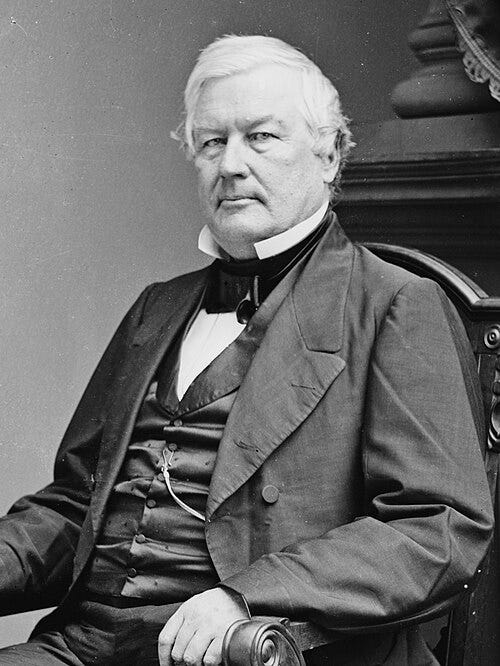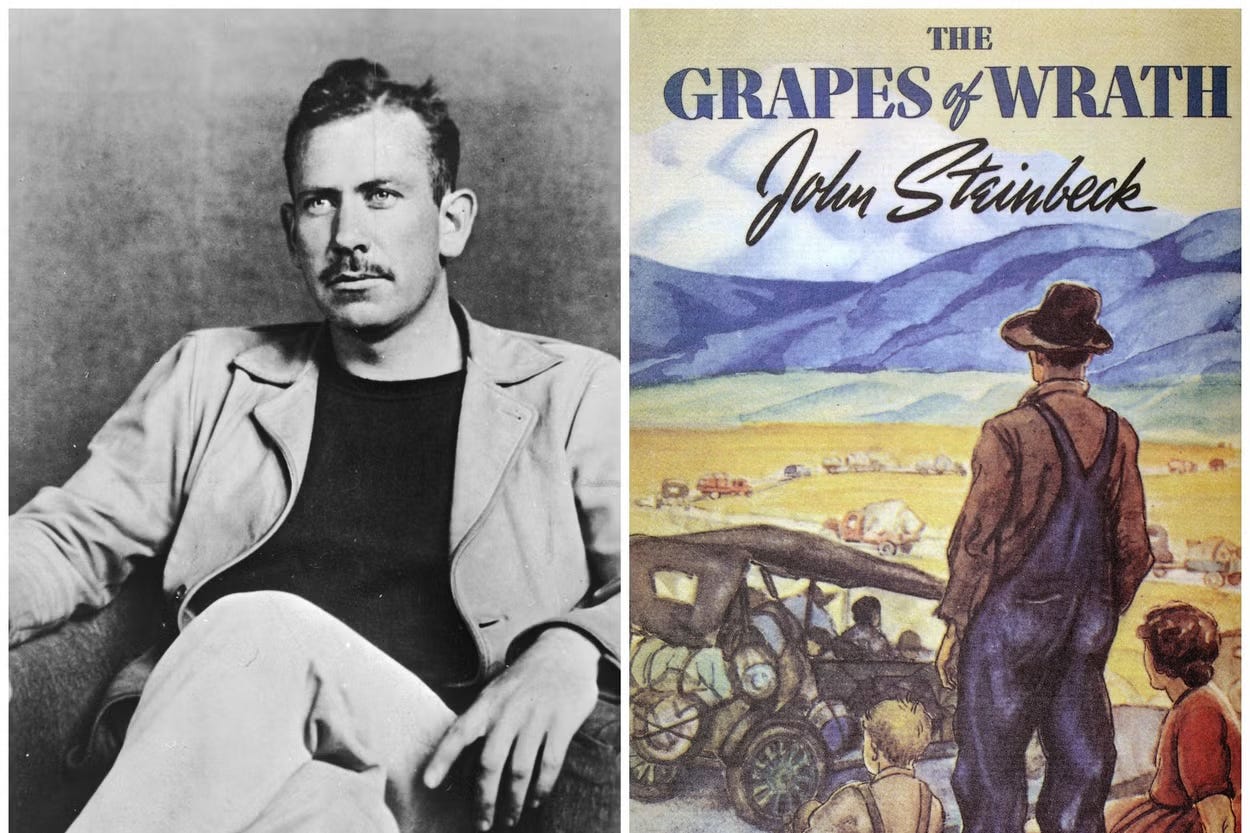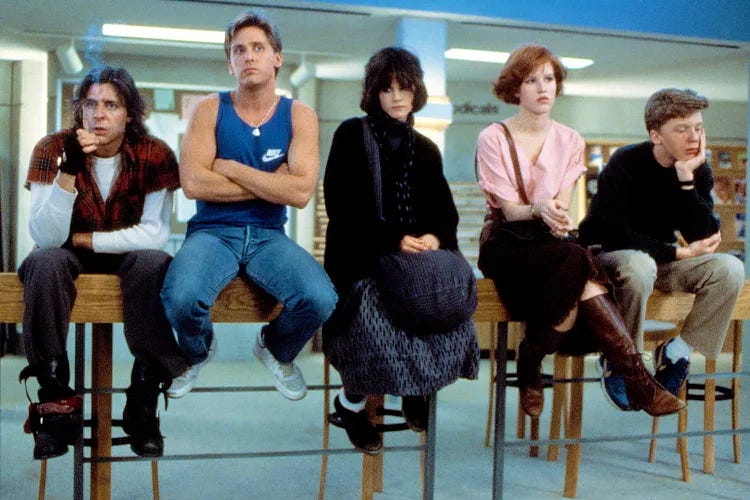There Are No New Stories. Only Old Stories Told in New Ways
“Real evil is…boring.” – Simone Weil
When I was a kid someone told me there were no new stories, only old stories told in new ways. Once I saw it, I saw it everywhere. So let’s revisit old stories that shed light on current headlines.
1) Hateful, Xenophobic Presidents Aren’t New. Remember Millard Fillmore?
Trump is not the first no good, very bad President. Millard Fillmore first ran for governor of New York. He ran an anti-Catholic, anti-immigrant campaign. (Nativism was a populist movement at the time that favored native born Americans over immigrants, especially Catholic immigrants, who it was believed would not be good Americans. Fascist politics always foments ethnic and religious division. This particular type of shameful rhetoric strikes close to home. My Catholic German ancestors, as well as those on my husband’s side, had crosses burned in their yards by the KKK.)
Anyway, Millard Fillmore became Vice President of the United States and, when President Zachary Taylor died, President.
Fillmore signed into law one of the worst pieces of legislation in US history: The Fugitive Slave Act. Under the Fugitive Slave Act, suspected runaway slaves were denied due process. No trial by jury. No ability to testify in court. No basic human rights. Zero proof or documentation was required to prove that they were slaves. What this meant, was that any free black could be nabbed off the street if a white person said, “That woman was my slave and she ran away from me.”
As a result, many free blacks were kidnapped and forced into bondage. And all citizens were instructed by The Fugitive Slave Act to aid in the tracking and “return” of fugitive slaves. There were even financial bonuses given to officers and judges who turned in black people. Anyone who harbored or helped a runaway slave could face fines or imprisonment. Americans who opposed slavery in the North were essentially forced to impose it on others despite their beliefs and the laws in their state.
Fillmore ran for a second term with the Know Nothing Party. The Know Nothing Party wanted an America in which Catholics would be banned from teaching or holding public office. Sound familiar? Luckily, he lost his re-election bid.
Abraham Lincoln once said, “If the Know-Nothings get control [the Declaration of Independence] will read all men are created equal, except negroes, foreigners, and Catholics.”
HOW IT RELATES TO TODAY:
Our Vice President J.D. Vance recently said at a dinner hosted by the Claremont Institute, which has pushed for an end to birthright citizenship, “Some Americans are more American than others.” Which ones I wonder? You know ‘em when you see ‘em I guess...
MAGA finds that deportation theater and getting rid of any foreign-born Americans is a winning issue for them. They’ve sold working class whites on the idea that the reason there aren’t great manufacturing jobs, or that wages are low is solely because of immigrants. Not, you know, NAFTA or the no good monopolists who, unlike monopolists in the past, do not actually make or produce anything (think Bezos) and treat their employees like crap.
America is not a blood and soil nation. It is important to get this right. It is a nation of immigrants who subscribe to a common creed as set forth in our founding documents (the Declaration of Independence and the Constitution). Vance and MAGA are pushing the narrative that America belongs to certain ethnicities and not others and that a common creed is not enough. They believe that Haitians and others who came here legally should also be deported. They spread lies about them eating your pets. This is akin to nabbing a free black and saying, “he was my slave.” It’s lawlessness (removing due process) under the guise of law and order. It’s scapegoating.
They are not simply securing the border and saying we cannot take any more immigrants at this time (a position that is reasonable). They are not simply saying we need to enforce more aggressively current immigration law with an emphasis on the deportation of gang members and violent criminals (again, reasonable). They are going much further. They are grandstanding for political points. And upending thousands of normal and good peoples lives’ in the process. The ending of due process for foreign born Americans, the aim of ending birth right citizenship, the nabbing of nonviolent offenders off the street and sending them to internment camps like Alligator Alcatraz is a hateful and disgusting attempt to score political points by persecuting a largely innocent segment of the population.
What this means in practice is that a Latino who was brought to the United States as a baby, who has lived their entire life here, who has no criminal record, could be imprisoned indefinitely in inhuman conditions. And if they are “lucky”, deported to country where they have never lived and do not speak the language. So yes, no new stories only old stories told in new ways. Evil is…boring. And history tells us when laws are suspended for one group they will be suspended for others.
Will people whose ancestors were targeted by the Know Nothings (and WASPS whose ancestors were not) stand up for due process, birthright citizenship, and the idea that America is not about blood and soil but about ideas, or will they be complicit and look the other way as the “YOU WILL NOT REPLACE US” Unite the Right Charlottesville white nationalist types win? These groups, once on the Storm Front fringe now run the country it seems. I think, and hope, that Millard Fillmore and his ilk will lose their bids for re-election.
2) MIGRANTS AREN’T NEW: Remember the Grapes of Wrath?
I recently re-read John Steinbeck’s novel The Grapes of Wrath. Written in 1939, it won the Nobel Prize for Literature. It’s set in the Dust Bowl. In the first chapter the women and children are looking at the men who are surveying the desiccated fields. “Women and children knew deep in themselves that no misfortune was too great to bear if their men were whole.” Every line of the book is like that. Shockingly beautiful.
The Grapes of Wrath tells the story of poor whites, tenant farmers in Oklahoma during the Depression, who are forced off their land by drought and banks. They migrate, along with thousands of other families looking for work as pickers and farm workers, to California.
The characters in this book sound like my grandparents, who told me stories as a kid about the Dust Bowl. Part of why this book had such a profound impact when it was published is that we all tend to sympathize more easily with people who look and talk like we do, and the Joads, who are treated like foreigners and non-citizens in this book, were in fact white Protestant Americans.
The cops harass them and burn their roadside camps down trying to get them to leave. They incite fights among them trying to get them arrested. They are starving. They just want to pick in the fields for meager wages for food. They plead, “We ain’t no bums. We’re looking for work. We’ll take any kind of work.” But because they are poor and othered as Okies, they are suspect. People don’t want them to stay and vote. They don’t want them to fill up the welfare rolls. Sound familiar? Instead of trying to figure out a solution to the hunger, poverty, and ecological crisis crippling the nation, they try to scare and humiliate and scapegoat the laborers.
HOW IT RELATES TO TODAY: The Grapes of Wrath will move you because it’s art and we always need art and beauty, but also because it makes the migrant laborers feel like people with dignity, like us. As wars, climate change and poverty force many people to become migrants, it’s worth knowing and telling the stories of our own people. Ask yourself, why did your ancestors emigrate to America? And why did they continue moving around once here looking for a better life? When we tell and retell these stories it becomes easier to see, as Greg Boyle writes, “There is no us and them, only us.”
3) IDENTITY POLITICS HAVE always been Lame: Remember The Breakfast Club?
I saw a post the other day on Threads that read, “I have a theory that everyone watched a movie between the ages of 9 and 13 that shaped their worldview forever.” One of those movies, for me, was John Hughes’ 1985 film “The Breakfast Club.”
“The Breakfast Club” was the kind of movie that was re-aired on daytime TV when I was a kid. My parents had a television in their kitchen. That’s where I would watch things I wasn’t supposed to, like “The Breakfast Club”, perched on a stool with the volume turned down low.
You know the plot: Five teenagers are sentenced to Saturday morning detention under the angry eye of Mr. Vernon, the Vice Principal. At first the kids are suspicious of and even cruel to one another. There’s Bender, the anti-social “criminal” who sexually harasses Claire “the princess” or popular girl. (Don’t listen to people who want to cancel this movie because Claire is a victim of sexual harassment. (No new stories, remember?) There’s Brian “the brain.” Andrew “the athlete.” And Allison the probably neurodivergent “basketcase.” High school is all about labeling people and ranking their identities as better or worse.
Andrew calls Bender a “waistoid” and tells him he is a non-person, “You know, you don’t even count. If you disappear forever, it wouldn’t make any difference.” Claire tells Brian that his clubs “don’t count” because they’re academic clubs.
All the kids hate and fear one another, but it’s a long day with nothing to do but sit in the library so in a somewhat contrived plot twist, they all smoke Bender’s weed and start actually opening up to one another and confessing what they did to end up in detention. What they realize, of course, is that they have more in common than they could have ever imagined. They all have difficult relationships with their parents. Allison’s ignore her. Bender’s abuse him. Andrew and Brian’s parents only love them when they perform well on tests or in sports. They all feel trapped by the roles they’ve been asked to play. They all feel misunderstood. They all feel oppressed by the powers that be, in this word adults like Mr. Vernon.
HOW IT RELATES TO TODAY:
Many people never seem to get over high school. They build a whole personality around the accidents of their birth. This happens on the Left and the Right. They double down on identity instead of actually figuring out who they are. Self-knowledge is not easily won. Identity stuff isn’t great in high school and it isn’t great in politics.
Instead of building coalitions around a common cause it divides people and foments anger and dysfunction.
In the history of worker’s rights and union busting, identity categories were always used to divide workers and keep them fighting amongst themselves instead of fighting together against the owners, bosses, and rich guys who mistreated them. The idea was to keep black and white share-croppers, Italian and Irish, gay and straight, fighting about who is better, instead of uniting around the issues that impact them all like safer working conditions.
The kids’ in The Breakfast Club start to like and care about each other by the end of day in detention together. But they fear that when they go back to school on Monday they will pretend to hate each other again in order to fit in. But the movie makes you wonder, ‘What if they didn’t?’. How much better would it be if we had actual grown ups in power, people who wanted to solve problems like healthcare shortcomings, instead of dividing us into makers and takers?
There’s so much I love about The Breakfast Club. But the best line goes to Allison. Andrew asks, “My God, are we gonna be like our parents?” Claire says, “Not me. Ever.” Allison:" It’s unavoidable it just happens… When you grow up your heart dies.” Bender asks, “Who cares?” And Allison says, “I care.”
Don’t let your heart die. That’s the message I took from this movie as a kid. Don’t let your heart die.







I love how your writing opens up the world in new ways. There may be only old stories told in new ways, but it's important to remember the old stories and see their connections to the present.